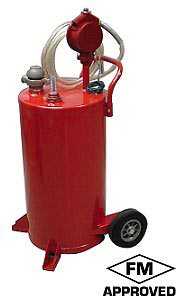Everybody has had it happen. You stored a car over a long term period of time, or maybe even a lawn mower or some other piece of gas driven equipment. Then, you go to start it up after this long lay off. Of course, it doesn’t start. Or maybe it starts, but runs poorly. Perhaps the engine knocks or sputters, or even stalls out. At the very least, the engine doesn’t run as efficiently as it should.
This is the most common reason for fuel failure. As gasoline ages, it starts to smell like varnish. It thickens, and it gums up. It clogs modern fuel injector ports that are much smaller than their earlier carburetor counterparts. When gas ages, or when it gets contaminated, such as with water, it doesn’t burn efficiently. Worse case scenario – you can actually harm the engine.
If you suspect the fuel in question is contaminated or old, it is safest just to dispose of it properly. Don’t take the chance of using it and causing more costly problems than just wasting a few gallons of gas. One of the first things to do if you suspect a problem is to check your fuel filter for particles, water or gunk.
You will need to siphon the bad fuel into a container if you need to bring it to a facility that will take it away. There are usually locations in most areas that accept hazardous waste materials. Usually, you can contact your local and state authorities to determine the location. Always dispose of bad gas properly, as it is considered a hazardous material and there are serious penalties these days for disposing of them improperly. Some local and city governments will also hold single day events annually for citizens to come in and dispose of these materials. Make sure to check with your local authorities what is considered to be the maximum amount you can transport as a private citizen. There are limits to the amount of gallons you can carry without a commercial vehicle and or container.
The best practice is to not let fuel go bad in the first place. First, don’t let it sit for too long. And if you must, you’ll need to put some fuel stabilizer in the gas to keep it fresh. With the advent of ethanol, it is also wise to put an ethanol treatment in your fuel as well. Especially when for use on small engines, like on lawn mowers. It would also be a good idea to run the engine once a month to help circulate the additives that may have settled.

